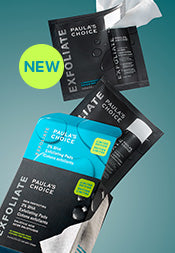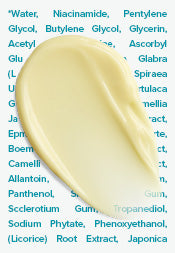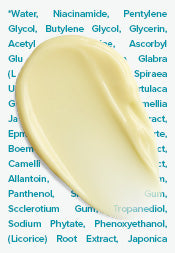Amino Acids for Skin
Amino acids are the building blocks of both peptides and proteins, and each has a specific role in skincare. Amino acids maintain the skin’s hydration, texture, and resilience, giving it an overall supple and healthy appearance.
It’s not a stretch to say that amino acids are indispensable for our body – especially our skin – whether we have dry, oily, or combination skin. That’s why we've chosen several amino acids to play a supporting role in many of our skincare products.
What Are Amino Acids?
There are many kinds of amino acids, but most scientists agree that there are 20 that are important to our health, divided into two types: essential and non-essential. The “non-essential” term doesn’t mean that those amino acids aren’t important; rather, it means that your body can make them on its own, so it’s not “essential” for you to get them elsewhere, such as through skincare, food or supplements.
“Essential” amino acids, on the other hand, are essential because they must be obtained from foods or supplements; a deficiency in even one of them can result in health problems.
There are nine essential amino acids: histidine, isoleucine, leucine, lysine, methionine, phenylalanine, threonine, tryptophan, and valine. The best food sources of these amino acids include animal protein (seafood, beef, poultry), followed by animal by-products such as eggs and dairy. Vegan sources of essential amino acids include quinoa and soy/tofu. Beans and nuts also provide some amino acids, but not all of the essentials. Individuals on a diet that excludes animal products may opt to take specific supplements to ensure they are getting enough amino acids for their daily health.
The 11 non-essential amino acids, which the body can make on its own, include alanine, arginine, asparagine, aspartic acid, cysteine, glutamic acid, glutamine, glycine, proline, serine, and tyrosine. Several of these are also known as “conditional” amino acids, meaning they’re made by the body but only under certain conditions, such as when we're ill or exposed to stress.
Each amino acid plays a vital role in maintaining our health as well as the appearance of our skin. But, just how do amino acids work on and within the skin and what are their benefits?
How Amino Acids Benefit Skin
Amino acids are naturally present in the skin, as part of what’s called our natural moisturizing factors (NMFs). Within the skin’s uppermost layers, amino acids work as conductors, orchestrating an incredibly complex “concert” that allows our skin to thrive and prevent dehydration.
One of the ways they do this is by working in harmony with aquaporins (the body’s water transport system) to move moisture throughout the skin. Because of this, the primary benefit is that the amino acids help maintain the skin’s smoothness and hydration, something they also do when applied via skincare products. Hence, it’s perfect for dry, oily or combination skin.
There also are more surprising benefits of these small, but potent skincare heroes: Some amino acids work as antioxidants; however, most of them are believed to play an even greater role by helping skin create more of its own antioxidants, such as glutathione. Topically applied amino acids help strengthen the skin’s natural defence system, boosting its anti-ageing properties and preventing environmental damage.
Interestingly, research has shown that synthetic amino acids often have greater hydrating ability than animal- or plant-derived amino acids. Because many amino acids are animal-derived, this is encouraging news if you prefer to avoid such ingredients, as we do.
The Best Amino Acids for Skin
Although all the amino acids mentioned above play a role in creating and maintaining smooth, healthy, younger-looking skin, a few also have more specialised roles, which make them even more desirable to see in skincare products in Singapore:
- Arginine plays a role in repairing visible skin damage.
- Histidine has antioxidant abilities and can soothe skin.
- Methionine neutralises damaging substances before they can harm the skin.
- Lysine helps visibly firm skin’s surface by reinforcing its supportive elements.
- Proline, leucine, and glycine diminish the look of fine lines and wrinkles.
How Amino Acids Work with Peptides
All amino acids included in skincare products work in combination with other ingredients that are also part of the skin’s NMFs, including our favourites glycerin, ceramides, various peptides, and hyaluronic acid. These amino acids work particularly well with peptide serums and creams — that’s why we include them in our Peptide Booster, a targeted product that significantly increases the skin’s hydration as it has anti-ageing properties.
Amino acids are truly versatile ingredients that complement other beneficial skincare ingredients, from antioxidant moisturizers and face creams to plant extracts to essential omega fatty acids. Without question, topically applied amino acids improve all skin types, whether it’s dry, oily, or combination, and can benefit all ages, especially if your goal is to prevent or diminish signs of ageing.
Learn more about anti-ageing & wrinkle solutions.
Shop our range of Peptides infused skincare.
References for this information:
Current Medicinal Chemistry, January 2018, pages 324–335
International Journal of Cosmetic Science, February 2017, pages 72–82
Amino Acids, November 2015, pages 2,265-2,278; and June 2012, pages 2481–22489
Life Sciences, August 2015, pages 36–41
Biophysical Journal, April 2014, pages 1701–1709
Bioscience Reports, March 2014, ePublication
European Journal of Dermatology, April 2013, pages 195–201
Journal of Advanced Research, July 2010, pages 169–177
Journal of Cosmetic Dermatology, June 2007, pages 75–82
Recommended Products
Peptide Booster
OMEGA+ Complex Moisturizer
OMEGA+ Complex Eye Cream












